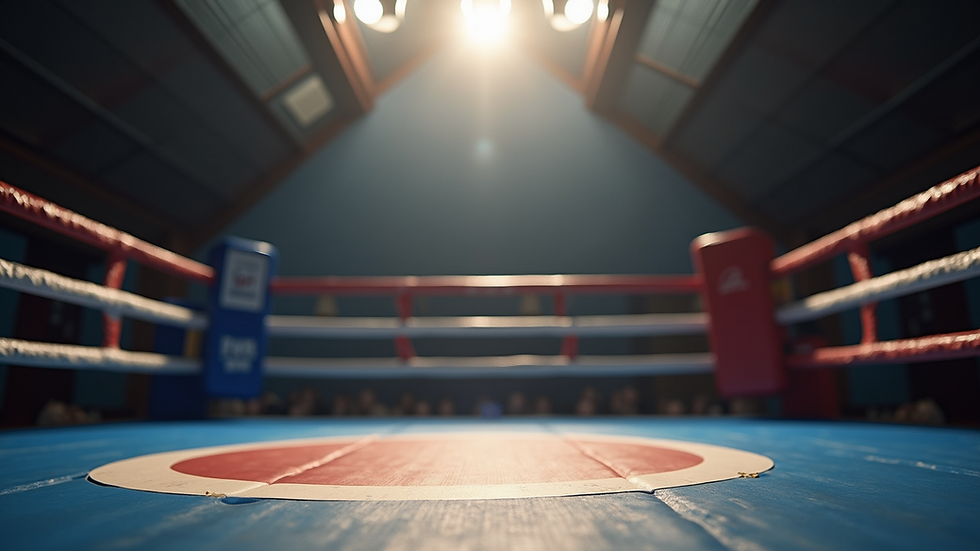Unlocking Boxing Brilliance: How Fundamental Skills and Your Coach Can Transform Your Fight Game
- Daniel Nubour
- Jun 11, 2025
- 4 min read
Boxing is not just about throwing punches; it's an art that requires precision, determination, and a solid grasp of fundamental skills. Whether you're stepping into the ring for the first time or gearing up for a championship, understanding these core abilities is vital for success. The right coach plays a crucial role in refining these skills and helping you reach your potential.
In this post, we will delve into the importance of boxing fundamentals and how an effective coach can elevate your training and performance.
Why Fundamentals Matter in Boxing
Every successful boxer shares a solid foundation of fundamental skills. These essential techniques include:
Stance: Your foot and body position is critical for both offensive and defensive maneuvers. A balanced stance enhances your mobility and reaction time. For instance, boxers with a proper stance can pivot quickly, allowing them to evade punches and counterattack effectively.
Footwork: Agile footwork is about more than just moving around the ring. It dictates your ability to land punches and avoid getting hit. Boxers who excel in footwork can maintain a distance of about three feet where striking becomes effective, giving them an edge in fights.
Punching Technique: Mastery of different punches—like the jab, cross, hook, and uppercut—is vital. Each punch has its mechanics. For example, a well-executed jab can create a 30% greater reach, giving you the ability to dominate exchanges.
Defense: Skills like blocking, slipping, and bobbing are crucial for survival in fights. For instance, effective head movement can reduce the likelihood of being hit by more than 60%, transforming you into a difficult target for opponents.
With a strong grasp of these fundamentals, boxers can develop a complex skill set that amplifies their effectiveness in the ring.
The Role of a Coach in Skill Development
While self-training is essential, the benefits of having a knowledgeable coach are immense. Here’s how a coach can enhance your fundamental boxing skills:
Personalized Feedback
A coach can spot inefficiencies in your technique that you may overlook. This feedback is invaluable; it allows you to perfect your stance, footwork, and punches. For example, a coach might notice a common mistake where you drop your hands while throwing a punch. Addressing this can reduce vulnerability to counters.
Structured Training Plans
An effective coach crafts a targeted training plan focusing on fundamental skills. This regimen might incorporate specific drills for footwork, shadow boxing, and sparring sessions. Studies show that a structured training regimen increases skill retention by up to 40%, allowing you to build a solid foundation over time.
Motivational Support
Training is physically and mentally demanding. A coach provides motivation, encouraging you to push beyond your limits. Research indicates that having a supportive coach can boost performance by as much as 30%, making a significant difference during challenging training moments.
The Importance of Drills
Incorporating drills into your practice can fast-track your mastery of boxing fundamentals. Here are several effective drills to enhance your skill set:
Jump Rope for Footwork
Jumping rope is not just a warm-up; it is a key footwork drill. This exercise improves coordination and rhythm, which translates to better movement in the ring. Regular jump rope practice, about 10 to 15 minutes daily, can increase your agility by 20% in a month.
Shadow Boxing
This drill is excellent for refining your punching techniques and practicing defensive moves. It lets you visualize an opponent while working on skills in a pressure-free environment. Consistent shadow boxing has been shown to improve speed and accuracy by approximately 25% over time.
Heavy Bag Work
Hitting a heavy bag helps simulate real fight conditions, allowing you to apply your techniques. It builds strength and endurance while also highlighting areas for improvement in punching power. Fighters who incorporate heavy bag work into their routine report a 15% increase in overall performance.
Sparring
Sparring is the best way to assess your fundamentals in a live setting. You can practice your defensive techniques and footwork while reacting to an opponent. Engaging in sparring at least once a week gives you the real-time feedback necessary to refine your skill set.
Transitioning to Advanced Techniques
Once you have solidified your fundamentals, you can begin to explore advanced techniques. Your coach can introduce complex strategies, combinations, and counter-attacks based on the foundational skills you've developed. For example, anticipating an opponent's movements requires a strong foundation in defensive techniques. Proper footwork allows you to create openings for effective counter-strikes.
The stronger your foundation, the more adept you'll become at adapting to various styles and opponents.
Continuous Evaluation and Improvement
Boxing is an ongoing journey of growth. You should keep refining your fundamental skills as you progress. Regular training and consistent evaluation from your coach can lead to remarkable improvements over time. Set specific short-term and long-term goals to maintain focus and motivation throughout your training.
The Journey Toward Excellence
Mastering boxing fundamentals is essential for any fighter looking to excel. With the guidance of a knowledgeable coach, you can ensure that these core techniques are not only learned but perfected.
Champions are made through dedication and practice. A supportive coach can be your most significant asset. Embrace the journey to master the fundamentals and unlock your full boxing potential.






Comments